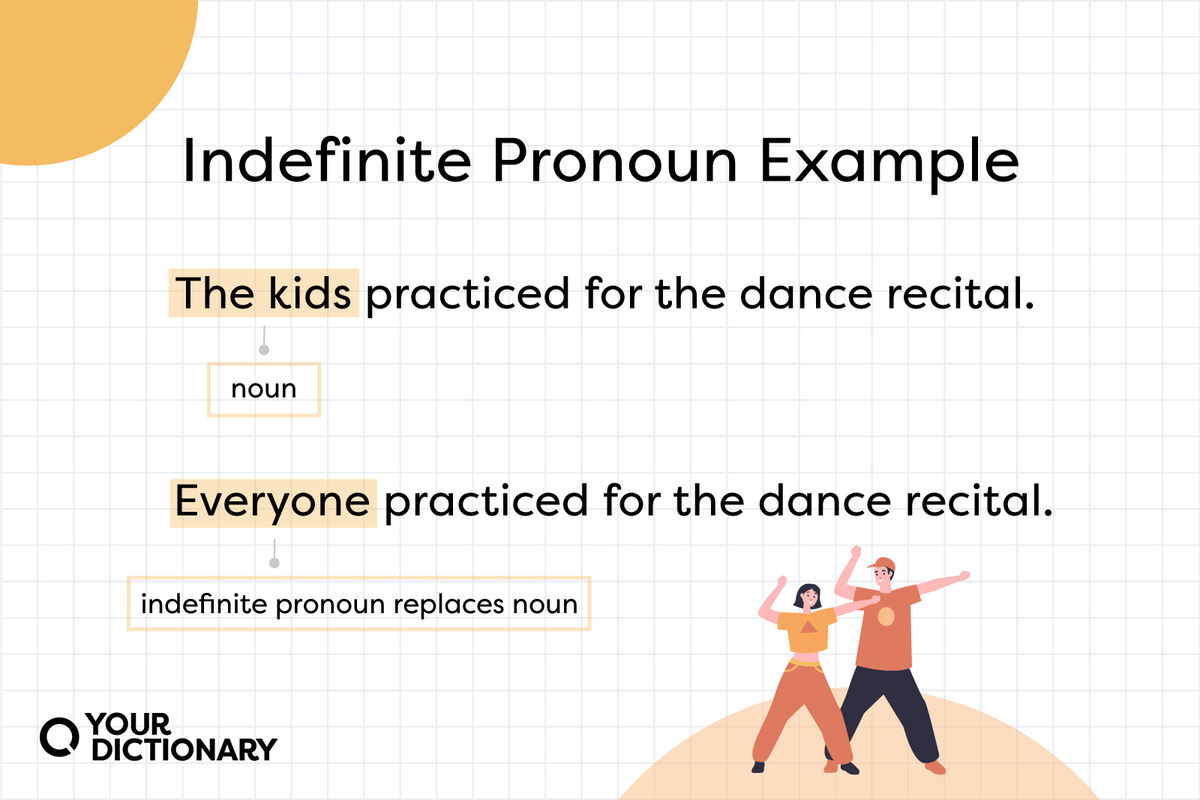
No one likes uncertainty. When you ask “What’s for lunch?” the last thing you want to hear is “Something.” (Is it a sandwich? Is it soup? Just say what it is!) But uncertainty has its place in grammar, and indefinite pronouns — like the pronoun something — are just what you want when you’re not feeling sure about a noun.
What Is an Indefinite Pronoun?
An indefinite pronoun doesn’t refer to a specific noun (person, place, thing, or idea). Like all pronouns, indefinite pronouns replace a noun in a sentence — but only when the noun (or the amount of nouns) is unknown.
- Can anyone help me? (Anyone could be your dad, a neighbor, a teacher, and so on.)
- Nothing is good enough for Roger. (Nothing replaces any unknown noun that Roger doesn't like.)
- I'll eat either for breakfast. (Either replaces two options that we don't know.)
- Both are great choices to wear tonight. (Both could mean dresses, jackets, outfits, shirts, and so on.)
- We've picked out several and will show you tomorrow. (Several could mean any number of items, but we don't know what they are.)
Singular Indefinite Pronoun Examples
Any indefinite pronoun ending in -one or -body is considered singular because it addresses each person within a group. Notice that in this list of indefinite pronouns, you can replace each one with a singular noun (such as Anne or my dad) and it would still make sense.
|
Singular Indefinite Pronoun |
Example Sentence |
|
another |
Margie has two dogs and is looking for another. |
|
anybody |
Does anybody want to buy my bike? |
|
anyone |
Anyone can play this game. |
|
anything |
I didn’t see anything. |
|
each |
Each brought a plated dish to dinner. |
|
either |
Either would be a good choice. |
|
everybody |
Have you talked to everybody? |
|
everyone |
Everyone practiced for the dance recital. |
|
everything |
I lost everything in the fire. |
|
little |
Little is known about the bank robber. |
|
much |
No one has told me much. |
|
neither |
Neither will admit that they stole the candy. |
|
nobody |
Nobody saw the police arrive. |
|
no one |
Tell no one what you've seen today. |
|
nothing |
Nothing matters more than love. |
|
one |
One could call the news station. |
|
somebody |
Can somebody help me? |
|
someone |
See if someone can bring chips to the party. |
|
something |
Something doesn’t feel right. |
Why Aren’t “Everybody” and “Everyone” Plural?
It’s easy to see why somebody and someone are singular indefinite pronouns, since they’re addressing one person. So shouldn’t everyone and everybody be plural since they address more than one person?
Nope — everybody and everyone are singular. They end in -body and -one, so they require singular verbs.
- Everyone is going to the party.
- Everybody admires you.
Try saying “Everyone are going to the party.” It doesn’t make sense because everyone is singular. However, if you replace everyone with a plural noun (My friends are going to the party”) you do use a plural verb.
Plural Indefinite Pronoun Examples
So if all those pronouns are singular, would you ever use a plural verb with an indefinite pronoun? Yes, if you're replacing a plural noun or a plural pronoun, such as we or they. Plural indefinite pronouns include:
|
Plural Indefinite Pronoun |
Example Sentence |
|
both |
We need both to unlock the vault. |
|
few |
Few came to the banquet. |
|
fewer |
Fewer voted this year than ever. |
|
many |
Many expressed concern about the new law. |
|
others |
We love to travel, but others prefer to stay home. |
|
several |
Several raised their hands in support. |
Examples of Indefinite Pronouns That Can Be Singular or Plural
Some indefinite pronouns can be singular or plural, depending on the rest of the sentence and the noun they're replacing.
When they replace a singular noun, use a singular verb — and when they replace a plural noun, use a plural verb.
|
Indefinite Pronoun |
Example Sentence |
|
all (singular) |
All is forgiven. |
|
all (plural) |
All are welcome. |
|
any (singular) |
Is there any left for me? |
|
any (plural) |
Did any stay to help? |
|
more (singular) |
More is necessary in this document. |
|
more (plural) |
More are swimming in the lake. |
|
most (singular) |
Most seems accurate in the news story. |
|
most (plural) |
Most know about the surprise. |
|
none (singular) |
None of the pizza was eaten. |
|
none (plural) |
None are available for several months. |
|
some (singular) |
Some has been finished already. |
|
some (plural) |
Some do anything for attention. |
|
such (singular) |
Such is life. |
|
such (plural) |
Such are known as troublemakers. |
Indefinite Pronouns vs. Determiners
While indefinite pronouns replace nouns, that’s not the only way many of these words work. You can use many as determiners — words that modify a noun — by placing them in front of a noun instead.
- Some don’t believe in ghosts. (Some functions as an indefinite pronoun.)
- Some people don’t believe in ghosts. (Some modifies people.)
- All are accounted for. (All functions as an indefinite pronoun.)
- All students are accounted for. (All modifies students.)
- Each told me a different story. (Each functions as an indefinite pronoun.)
- Each child told me a different story. (Each modifies child.)